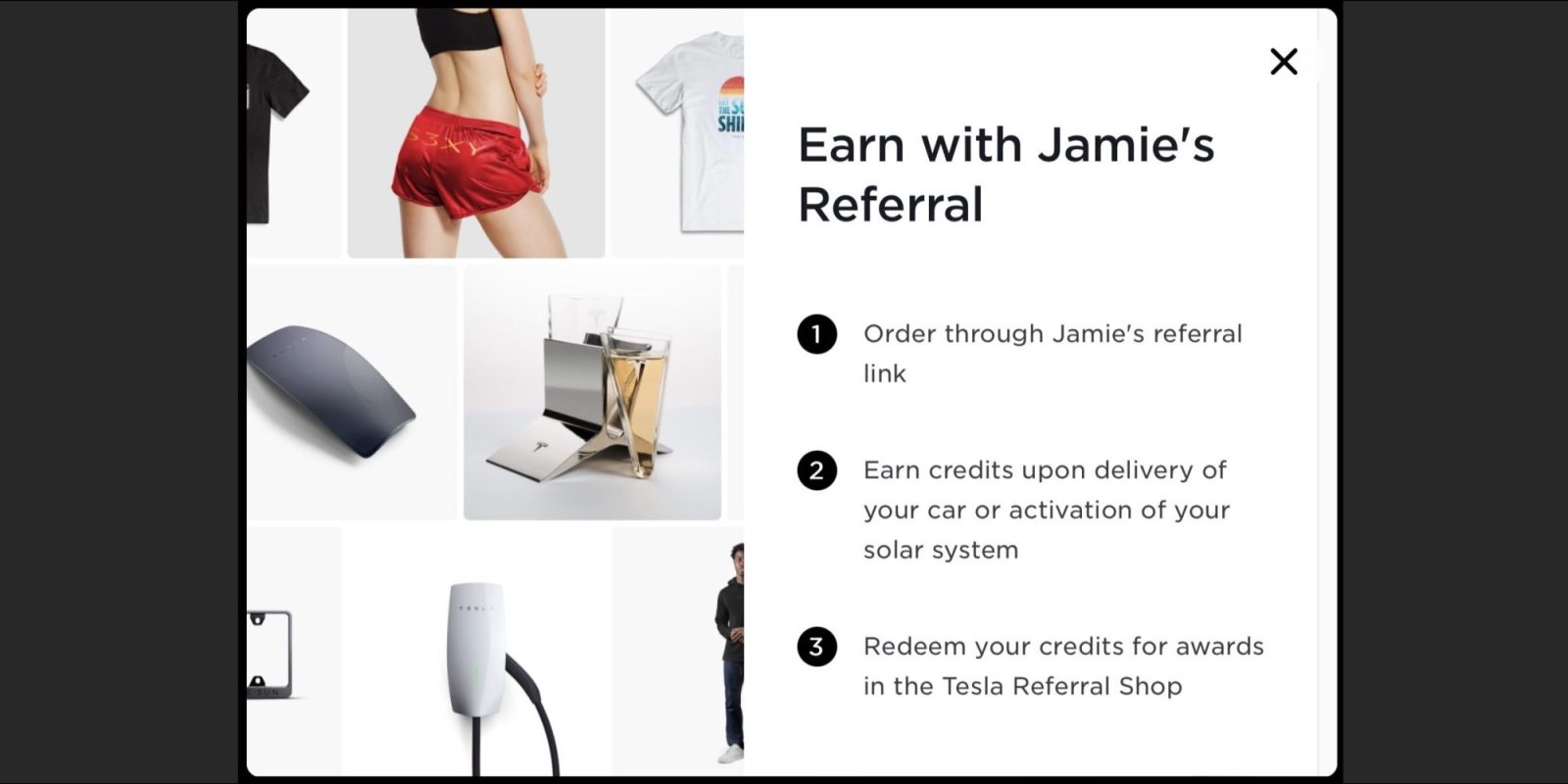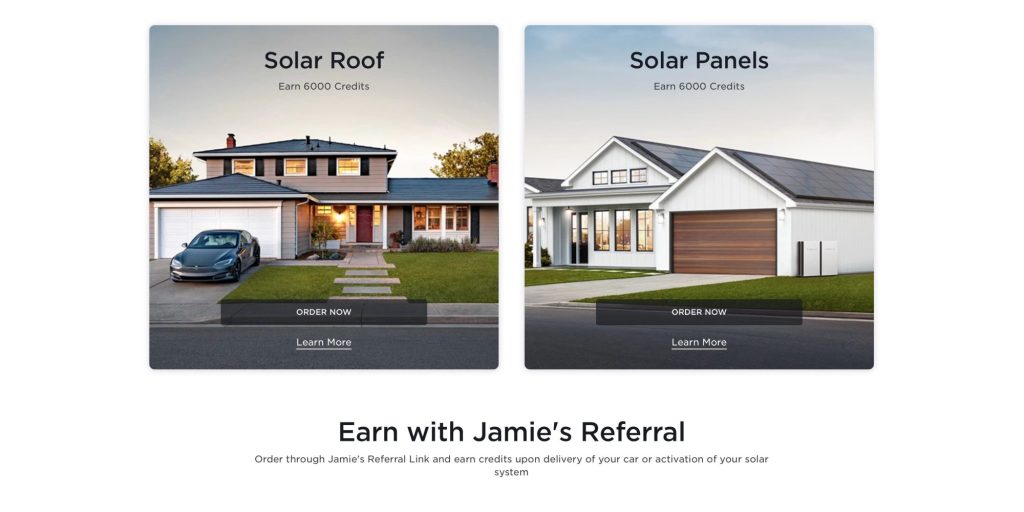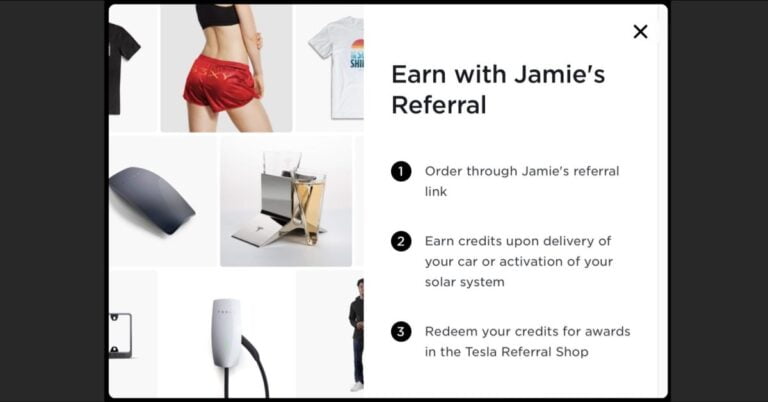
Tesla has revamped its referral program in North America, moving to a system that allows current Tesla owners to use their Tesla referral code to earn “loyalty points” that can be applicable to various Tesla products.
The latest return referral program gives “credits” to the buyer and referrer of a product, with a scaling amount of credits depending on the product purchased. Credits are only awarded to the buyer and referrer if the buyer is not a current Tesla customer – if they are a current customer, then they will earn their own “loyalty credits” but cannot use a referral code .
Tesla’s referral program page outlines the details, with more information available in the “loot box” section of the Tesla app.
Currently, the only products that qualify for credits are Tesla solar panels and the Tesla solar roof, both of which provide 6,000 credits each.
The page says “get credits to deliver your car or activating your solar system,” suggesting that cars may be added to the page at some point. We are not sure how many credits they will get if they are added to the program. While Tesla’s referral program ended last year for cars, cash rewards for solar referrals continued and were active until yesterday, when Tesla revamped the program to award credits instead of cash. .

Credits can be spent on other Tesla products, although they expire after 12 months if not spent. The products are a selection from those in the Tesla online store, including both useful accessories for Tesla owners and some of the more “meme” products such as short shorts by Tesla or strange glasses.
Here is a complete list of products available:
- Wall Connector – 6,000 credits / J1772 Wall Connector – 11,000 credits
- Tesla CCS Combo 1 Adapter – 5,000 credits
- 2,000 Supercharger Miles – 4,800 credits
- Model X/3/S/Y Pet Liner – 2,900 credits
- Tesla Sipping Glasses – 1,750 credits
- Tesla Short Shorts – 1,469 credits
- Hoodie – 2,000 credits
- License plate frame – 800 credits
- Wall connector faceplate – 1,500 credits
- Various T-shirts – 700 credits each
The prices don’t seem to compare to the prices of real-life items (for example, the Wall Connector is $400, and the J1772 Wall Connector is $550), but it seems that the value of a solar roof referral is about like the previous version of the program – in the range of several hundred dollars.
We’ve been expecting something to happen with the referral program for a while now, having reported last year that Tesla was considering changes to the program and then learned last month that Tesla had updated its mobile app with new referral program information.
Last month, Tesla launched a new “reward points” program in China, which turned out to be very similar to the recent changes to the referral program. China also gets quarterly and annual raffles, which seems to be lacking in the North American program. And Europe doesn’t seem to have a similar referral program update at this time.
Tesla originally created the referral program after requests from Tesla fans who wanted to be rewarded for the number of friends they converted to electric driving. In the early days of Tesla and EVs, word of mouth from EV fans was very effective in selling cars, especially given the number of questions prospective buyers might have about a new technology. .
The referral program starts with $1,000 in “Tesla credits” for each use of an owner’s Tesla referral code. Credits can be used on Tesla services and products, and later Tesla began offering various prizes such as wall connectors, wheel sets, Tesla-branded luggage, and even shipping your space photos. It was renewed several times, but eventually got out of control and Tesla killed the program after they promised more than 80 consecutive Roadsters to top referrers.
The program was then scaled back to offer 1,000 free Supercharger miles to buyers and referrers, and most recently included a cash reward for solar roof referrals.
So far, it looks like Tesla has mostly just revamped the existing cash rewards program for solar installations, but it’s clear they have more planned given the “car” verbiage on their referral page.
Acquisition of Electrek
It’s interesting timing, considering that Tesla recently scaled back its solar operations. We have received many reports of projects being canceled and Tesla has admitted that they have stopped operations, even in some popular markets, in the last few weeks. So it seems like a strange time to change a system for solar referrals.
But it’s not just about solar, is it? It seems clear that the program is intended to include cars at some point; they are not there yet.
The introduction of the referral program in China coincided with a drop in prices in the region, suggesting that Tesla is looking to increase demand after several years of continuous price increases both on the line and around the world.
While we have not yet seen a price drop in the US (and should not expect one), this could still be a way that Tesla is preparing to increase the demand for certain products, by adding them to the program of referral when or if they see the need.
As for how we feel about it – it seems more robust than previous programs. Instead of a maze of ever-changing prize tiers, some of which cost a fortune and took forever to deliver and some of which never happened, we now have a more clear list of readily available products that have some value for money but not enough to make. Referrers feel like total shills when recommending Tesla vehicles.
One of the issues with the original program, I think, is that it turned what was once innocent EV evangelism into a method for personal gain, thus making it seem like the word-of-mouth that Advocacy is done for monetary gain, rather than honest recommendations from EV fans. It threatens to make EV fans seem like car salesmen rather than true and honest advocates.
Now, there’s still a sense of earning money here, but it’s more like a perk – some T-shirts, some supercharger miles, or an extra charging connector for each use of a referral code. It’s not as overwhelming as the idea that someone can get a thousand dollar Powerwall system or maybe even a supercar after hawking a Tesla to their friends.
So this seems like an improvement, but we’ll have to wait to see how everything shakes out, and if Tesla adds other products to the program.
FTC: We use earned auto affiliate links. In addition.

